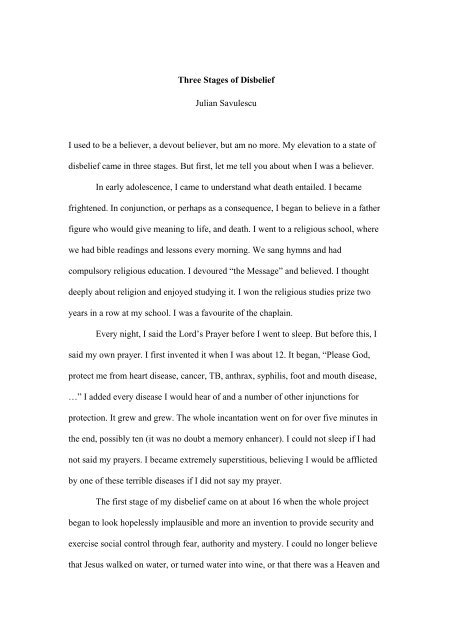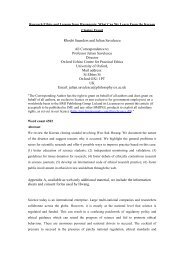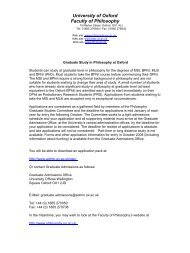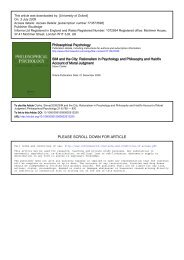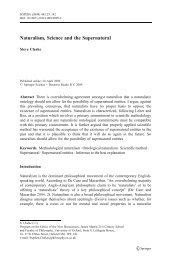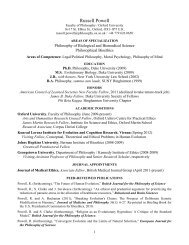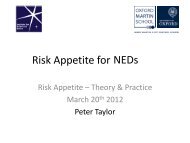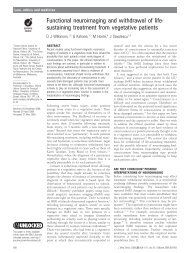Three Stages of Disbelief Julian Savulescu I used to be a believer, a ...
Three Stages of Disbelief Julian Savulescu I used to be a believer, a ...
Three Stages of Disbelief Julian Savulescu I used to be a believer, a ...
Create successful ePaper yourself
Turn your PDF publications into a flip-book with our unique Google optimized e-Paper software.
<strong>Three</strong> <strong>Stages</strong> <strong>of</strong> <strong>Dis<strong>be</strong>lief</strong><br />
<strong>Julian</strong> <strong>Savulescu</strong><br />
I <strong>used</strong> <strong>to</strong> <strong>be</strong> a <strong>be</strong>liever, a devout <strong>be</strong>liever, but am no more. My elevation <strong>to</strong> a state <strong>of</strong><br />
dis<strong>be</strong>lief came in three stages. But first, let me tell you about when I was a <strong>be</strong>liever.<br />
In early adolescence, I came <strong>to</strong> understand what death entailed. I <strong>be</strong>came<br />
frightened. In conjunction, or perhaps as a consequence, I <strong>be</strong>gan <strong>to</strong> <strong>be</strong>lieve in a father<br />
figure who would give meaning <strong>to</strong> life, and death. I went <strong>to</strong> a religious school, where<br />
we had bible readings and lessons every morning. We sang hymns and had<br />
compulsory religious education. I devoured “the Message” and <strong>be</strong>lieved. I thought<br />
deeply about religion and enjoyed studying it. I won the religious studies prize two<br />
years in a row at my school. I was a favourite <strong>of</strong> the chaplain.<br />
Every night, I said the Lord’s Prayer <strong>be</strong>fore I went <strong>to</strong> sleep. But <strong>be</strong>fore this, I<br />
said my own prayer. I first invented it when I was about 12. It <strong>be</strong>gan, “Please God,<br />
protect me from heart disease, cancer, TB, anthrax, syphilis, foot and mouth disease,<br />
…” I added every disease I would hear <strong>of</strong> and a num<strong>be</strong>r <strong>of</strong> other injunctions for<br />
protection. It grew and grew. The whole incantation went on for over five minutes in<br />
the end, possibly ten (it was no doubt a memory enhancer). I could not sleep if I had<br />
not said my prayers. I <strong>be</strong>came extremely superstitious, <strong>be</strong>lieving I would <strong>be</strong> afflicted<br />
by one <strong>of</strong> these terrible diseases if I did not say my prayer.<br />
The first stage <strong>of</strong> my dis<strong>be</strong>lief came on at about 16 when the whole project<br />
<strong>be</strong>gan <strong>to</strong> look hopelessly implausible and more an invention <strong>to</strong> provide security and<br />
exercise social control through fear, authority and mystery. I could no longer <strong>be</strong>lieve<br />
that Jesus walked on water, or turned water in<strong>to</strong> wine, or that there was a Heaven and
an afterlife. Such things seemed metaphysically inconsistent with what I knew <strong>of</strong> the<br />
world and any scientific understanding <strong>of</strong> it. The whole thing seemed like a fairy tale<br />
that had served a socially and psychologically useful function in the past, but had just<br />
run out <strong>of</strong> gas. This was the stage <strong>of</strong> metaphysical implausibility. It was not pr<strong>of</strong>ound,<br />
or novel, but it was my experience.<br />
I continued <strong>to</strong> hold a quasi-God concept. My father, who was a kind, generous<br />
and good man, said he always <strong>be</strong>lieved in his own version <strong>of</strong> God. God came <strong>to</strong><br />
represent not a s<strong>to</strong>ry about the world or the afterlife, but spirituality and the mystical.<br />
I started reading a lot <strong>of</strong> Dos<strong>to</strong>evsky and Tols<strong>to</strong>y, and was affected by it. They<br />
seemed <strong>to</strong> blend religion with philosophy and wisdom.<br />
Dos<strong>to</strong>yevsky wrote in Crime and Punishment: “Accept suffering and achieve<br />
a<strong>to</strong>nement through it—that is what you must do.” “For broad understanding and deep<br />
feeling, you need pain and suffering. I <strong>be</strong>lieve really great men must experience great<br />
sadness in the world.”<br />
And Tols<strong>to</strong>y wrote in War and Peace: “To love life is <strong>to</strong> love God. Harder and<br />
more blessed than all else is <strong>to</strong> love this life in one's sufferings, in undeserved<br />
sufferings.”<br />
These were great writers and students <strong>of</strong> human psychology. I absor<strong>be</strong>d their<br />
ideas like a sponge.<br />
But then I finished my time as a medical student and <strong>be</strong>gan work as a doc<strong>to</strong>r. I<br />
remem<strong>be</strong>r vividly the first death I had <strong>to</strong> certify as an intern. I went in<strong>to</strong> the room and<br />
the undertaker was waiting <strong>to</strong> take the body away. I did the necessary tests but then<br />
lingered. The undertaker could see me staring at the gaping, <strong>to</strong>othless mouth and the<br />
open, glazed eyes.
serene.”<br />
“They are always open. We sew them closed <strong>to</strong> make them look peaceful and<br />
I saw for the first time the reality <strong>of</strong> death and suffering. I did some hard jobs<br />
like Haema<strong>to</strong>logy and Oncology, and Intensive Care. I saw completely innocent<br />
ordinary young people die agonising deaths, their skin peeling from their body as they<br />
were narcotised <strong>to</strong> death. I saw horrible burns and amputated limbs from utterly<br />
meaningless accidents. I saw people screaming as they died and others silent with<br />
terror.<br />
I wasn’t there, but I remem<strong>be</strong>r hearing the typical s<strong>to</strong>ry <strong>of</strong> a young girl who<br />
was drunk and rolled her car. She regained consciousness <strong>to</strong> <strong>be</strong> <strong>to</strong>ld her spinal cord<br />
had <strong>be</strong>en severed completely at C5 and she would never move her arms or legs. But<br />
she might get <strong>of</strong>f the breathing machine. And the tear that came <strong>to</strong> her eye as she lay<br />
motionless.<br />
“It’s a high price <strong>to</strong> pay for getting drunk,” said one doc<strong>to</strong>r.<br />
That doc<strong>to</strong>r had long black hair and <strong>be</strong>ard, a leather jacket and a pocket knife<br />
on his <strong>be</strong>lt. He looked like the Hell’s Angel “Sonny” Barger. He is also a meticulous,<br />
brilliant neurosurgeon who has done great good in his life.<br />
While there is a voluminous theological literature spanning millennia on the<br />
problem <strong>of</strong> suffering, and great writers like Dos<strong>to</strong>yevsky and Tols<strong>to</strong>y propose<br />
solutions, the idea that there was any value or meaning in suffering and death<br />
evaporated for me. What I saw and heard just killed a <strong>be</strong>lief in God for me, for no<br />
special philosophical reason. This was a phase <strong>of</strong> existential senselessness. I bought a<br />
safe car, went surfing and skiing a lot and decided <strong>to</strong> do philosophy, not <strong>to</strong> find<br />
meaning but <strong>be</strong>cause I had always enjoyed it, <strong>be</strong>fore I was dealt my nasty card. That<br />
was my response <strong>to</strong> the value <strong>of</strong> suffering.
My final phase <strong>of</strong> dis<strong>be</strong>lief came only relatively recently. I continued <strong>to</strong> want<br />
<strong>to</strong> <strong>be</strong>lieve, wanting the protection <strong>of</strong> a father and the certainty and determinate<br />
direction <strong>of</strong> religion. But slowly I accepted the burden <strong>of</strong> atheism. I remem<strong>be</strong>r once,<br />
looking at the ceiling, wishing God or some Impartial Observer existed so I could<br />
simply ask Him what I should do in one dilemma in my life. To ask him who was<br />
right. But there was no one there. I spoke <strong>to</strong> great philosophers, psychiatrists,<br />
psychologists, and other people with wisdom and experience. I received sensible,<br />
reasoned lines <strong>of</strong> advice which conflicted. I came <strong>to</strong> accept that there is no one who<br />
will alleviate the burden <strong>of</strong> moral choice. And in the end, we will die alone. We must<br />
make these choices ourselves, and <strong>be</strong>ar the responsibility <strong>of</strong> them.<br />
It is difficult <strong>to</strong> <strong>be</strong> a good atheist. Because it is difficult <strong>to</strong> <strong>be</strong> a good man. And<br />
it is difficult <strong>to</strong> confront ambiguity, uncertainty and the unavoidable losses <strong>of</strong> human<br />
life and choice, without clutching at false truths.<br />
Would I have changed what I have done, the choices I have made, if I had<br />
<strong>be</strong>lieved in God? If God exists, He will judge what we have done. It is vaguely<br />
reassuring <strong>to</strong> know that when people disapprove <strong>of</strong> what we do, God would know our<br />
real reasons. I am prepared <strong>to</strong> account for what I have done.<br />
I have hurt many people but I have tried <strong>to</strong> do what I should do. There are<br />
many things I would have done differently but, at the time, they seemed right. I hope I<br />
will not make the same mistakes, but fallibility is a part <strong>of</strong> the human condition.<br />
Would God reward Bush for invading Iraq, or those who s<strong>to</strong>p the use <strong>of</strong><br />
contraception in poor, undeveloped, overpopulated parts <strong>of</strong> the world or the use <strong>of</strong><br />
condoms <strong>to</strong> prevent the spread <strong>of</strong> AIDS, or terrorists who kill in His name? I find it<br />
incredible that He would reward the deli<strong>be</strong>rate, foreseeable, avoidable infliction <strong>of</strong><br />
misery even in His name. More incredible than His existence.
Now, I <strong>be</strong>lieve God’s existence is irrelevant. What matters is ethical<br />
<strong>be</strong>haviour, <strong>to</strong> act with good reason, <strong>to</strong> reflect and accept responsibility for action, and<br />
for failing <strong>to</strong> act. It won’t matter <strong>to</strong> God that actions were performed, or not<br />
performed, in His name or by reference <strong>to</strong> His scriptures. What matters is whether<br />
they are ethical.<br />
Beckett, another favourite <strong>of</strong> my youth, wrote in Waiting for Godot, “To every<br />
man his little cross. (He sighs.) Till he dies. (Afterthought.) And is forgotten.”<br />
It may <strong>be</strong> that the crosses which we <strong>be</strong>ar are in some sense small. And<br />
certainly we will <strong>be</strong> forgotten. But in <strong>be</strong>tween, there is also our life. I hope, if He<br />
exists, He will approve <strong>of</strong> what I have chosen <strong>to</strong> do. But for me, what matters now, is<br />
that this life is what I have chosen and I chose it with good reason. And that spattered<br />
among the times <strong>of</strong> great suffering, and <strong>be</strong>fore our eventual annihilation, there are<br />
moments <strong>of</strong> exquisite <strong>be</strong>auty, deep human connection, happiness and fulfilment.<br />
Watching my son laugh as he rides a bike for the first time. Taking my<br />
daughters, who are now nine and eleven, <strong>of</strong>f piste skiing for the first time in two feet<br />
<strong>of</strong> virgin powder snow. Doing one hundred or more turns and finding them both right<br />
<strong>be</strong>hind, with smiles from ear <strong>to</strong> ear, as they realise they can do it and that they have<br />
<strong>be</strong>en flying. Paddling out in the surf in the early morning sun, in a crystal calm ocean<br />
<strong>be</strong>tween the corduroy sets, as the first wave hits me in the face. That is what I <strong>be</strong>lieve<br />
in now.


